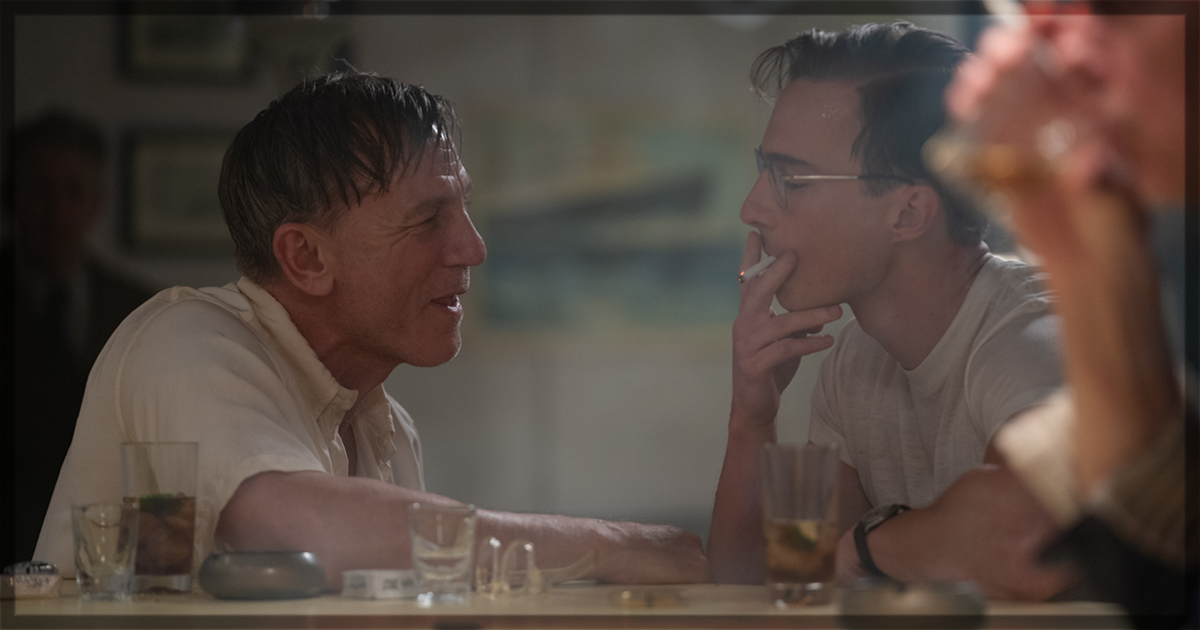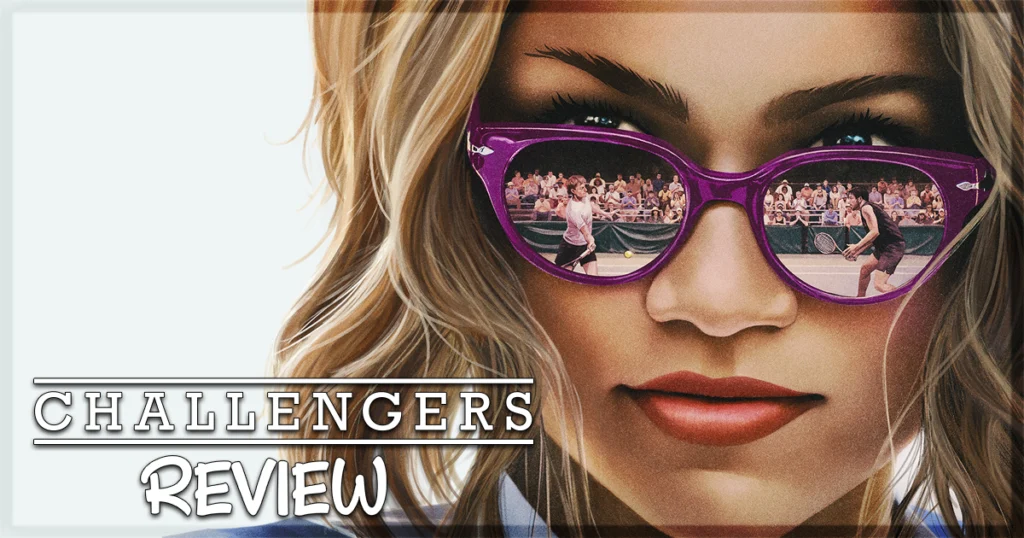What you have to realize about Queer is that it is an adaptation of a book by William S. Burroughs, so the queerness on display here is less about sexuality, but more a way of looking at the world. William Lee, largely Lee to his friends (an astonishing Daniel Craig), is a dilettante and financially independent expatriate in 1950s Mexico City frittering away his energies chasing young men and drugs. Not that there’s anything wrong with that, but the movie begins with the strong implication it will largely be about sex stuff before pivoting very, very, very hard into drug stuff. Either you’re along for the ride or not – and watching Mr. Craig continue to pulverize his James Bond image is worthwhile on its own merits – but writer Justin Kuritzkes and director Luca Guadagnino have taken a perverse pleasure in curb-stomping all our expectations.
Lee sleeps all day in his disgusting apartment and spends all night on a circuit of the queer-friendly bars and clubs of Mexico City, chatting with his fellow Americans, most prominently Joe (an excellent Jason Schwartzman playing very strongly against type), and picking up randoms however he can find them. At a cockfight (metaphor alert!) he spots a clean-cut young American, whose name is eventually learned to be Eugene Allerton (Drew Starkey) and falls head over heels. There’s a repeated motif of Lee imaging himself touching Allerton, with the shadow imagery laid over what’s really happening. Allerton is polite but keeps his distance, focusing his social life on a two-person chess tournament with a bargirl, until Lee begins bribing him to spend time with him. Allerton acquiesces without altering that distance in ways which have Lee, Joe and others endlessly discussing whether or not Allerton is actually queer, although the eventual sex scenes answer that fairly robustly. You can do something and you can like to do something without necessarily talking about it or labelling it, a perspective on gay life which was the main key to survival until very recently and is now a worldview that’s utterly foreign to anyone under thirty. That cultural shift – the most pleasing and important one of my lifetime – will hamper the movie’s reception.
Until the second half, that is. Lee has read about a hallucinogenic drug called yagé – more commonly known these days as ayahuasca – and convinces Allerton to join him on a road trip across South America to get their hands on some. He’s interested in telepathy, he explains to anyone listening, as they observe Allerton and Lee together and smirk. Finally our heroes end up deep in the Ecuadorian jungle at the hut of an American scientist, Dr. Cotter (Lesley Manville, looking less attractive than any American actress would allow herself to appear onscreen), a world expert in yagé and a remarkable judge of character. And that begins an utterly terrifying journey of another kind.
The opening credits, done in the style of Wes Anderson, are soundtracked to Sinead O’Connor’s version of “All Apologies” by Nirvana, and indeed the meet-cute between Lee and Allerton is soundtracked to the OG version of “Come As You Are.” But the anachronistic music is a bait and switch, because the story here is not modern feelings about either queerness or drug use, and instead how one man discovered the limits of any human relationship with another person. There’s a remarkable amount of modern dance – an interesting new trend in world cinema to express complicated feelings non-verbally – and some unusually vivid drug-based hallucinations. The snake curved into an infinity symbol while eating its own tail is the least gross of them.
Mr. Craig, who has not played a straight character since he stopped playing Bond, is very busy here reminding us all of what an incredible actor he has always been and how his talents were very nearly swallowed up by his most famous part. The neediness and entitlement that Lee flutters between involves a great deal of physical work, with Lee’s body language expressing his anxieties, his flirtations, his impatience, and his desperate need for physical annihilation. The single close-up shot of Lee prepping a dose of heroin, injecting himself, then sitting in silence with a beer and a cigarette as the drug takes hold involves nearly unbelievable work from Mr Craig in expressing a curdled mix of self-loathing, unidentifiable pain, and just a hint of optimism that this time the drugs will work. Mr Starkey’s contained performance is by its nature not as showy, but his restraint is quite compelling. It’s easy to see how Allerton could drive Lee mad.
The main creative team of Challengers – which was only released in the US in April of this year – are all also present and correct here. Sayombhu Mukdeeprom’s cinematography emphasizes the humidity of the settings while rarely pulling back from Lee’s routines. Trent Reznor and Atticus Ross’s score wraps around the anachronistic songs to emphasize the body – a pulsing heartbeat, a breath – though not as front and center as their work in Challengers. Mr. Kuritzkes also included a sequence probably not in Queer (a book unread by me) in which Lee hallucinates shooting someone balancing an apple on their head, which mirrors Mr Burrough’s real-life murder of his partner Joan Vollmer in a drunken party trick gone desperately wrong.
But Mr. Guadagnino cheats at the ending, cutting the movie’s emotional impact off at its knees, and seemingly not understanding the nature of Lee’s journey into the heart of darkness. It’s not the sex, or the drugs, or even the love of Allerton that he is seeking. Lee is chasing the removal of his self, a self that he loathes, because he doesn’t want to be queer, or in Mexico, or any of the things that has made him what and who he is. The repeated willingness to fling himself into unreciprocated relationships are all part of that self-destructiveness, which is also nearly impossible to articulate, because how do you argue for the removal of who you are? With a needle in the vein, that’s how. Mr. Burroughs knew that, and based on his work here Mr. Craig understands this too. In his portrayal of Lee he does more than both Mr. Guadagnino’s direction and Mr. Kuritzkes’ script wanted him to. It’s that towering, remarkable, devastating central performance by Daniel Craig that is the main reason to see Queer. The rest is sound and fury, nothing more.


